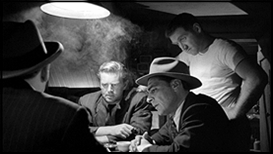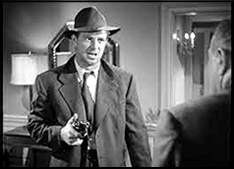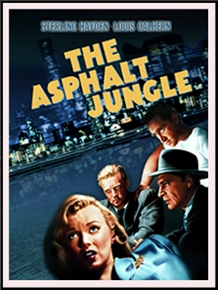Thu 1 Sep 2022
A Movie Review by Dan Stumpf: THE ASPHALT JUNGLE (1950).
Posted by Steve under Crime Films , Reviews[18] Comments

THE ASPHALT JUNGLE. MGM, 1950. Sterling Hayden, Louis Calhern, Jean Hagen, James Whitmore, Sam Jaffe, John McIntire, Marc Lawrence, Anthony Caruso, Marilyn Monroe. Based on the novel by W. R. Burnett. Director: John Huston.
Directed by John Huston, written by Huston and Ben Maddow, compared to Phil Rosen’s take on Dangerous Crossing [reviewed here ], The Asphalt Jungle mines W. R. Burnett’s novel for dramatic potential that I doubt even Burnett knew was there. It features career-capping performances by Sterling Hayden and Louis Calhern as players at the top and bottom ends of a jewel heist plotted by Sam Jaffe, backed up by a number of memorable cameos from such capable players as James Whitmore, Jean Hagen, Marc Lawrence, Barry Kelley and Marilyn Monroe.
Huston’s pre-fab defeatism melds very nicely with scenarist Ben (Johnny Guitar) Maddow’s genuinely subversive left-wing sensibilities into a film that has become a well-deserved classic.

Come to that, if you wanted a good notion of what a subversive screen-play really means, The Asphalt Jungle offers a prime example: To seemingly digress for a moment, novelist and screenwriter Borden (Red River, Winchester ’73, etc.), Chase once said that the secret of writing a good movie was to put in a part for John McIntire. McIntire appears (made up to look just exactly like the young Walter Huston) here as a Police Commissioner whose integrity stands out in sharp contrast to the corrupt tone of the film as a whole.
Indeed, The Asphalt Jungle makes quite a point of portraying its nominal “criminals” as possessed of more honor than their “respectable” counter-parts. So one could well wonder what-the-hell he’s doing there at all, except that his whole character was probably written in as a sop to the censors.

Yet even while making this nod to Convention, Maddow and Huston manage to sneak in a nice zinger: Late in the film, McIntire tells a bunch of reporters what a fine lot Policemen are, on the whole. And he’s convincing. For a moment, his speech almost seems to negate the whole tone of the film that preceded it. Then he concludes by characterizing Hayden, the one surviving member of the gang, as a “vicious hoodlum. A Man without human feelings or pity.”
Cut from there to a shot of Hayden (WARNING!) racing back to his old Kentucky homestead, to die in the clean air (END OF WARNING!) and the perceptive viewer suddenly sees things that were never dreamt of in McIntire and his whole philosophy. A nice touch, just one of many in this film.

September 3rd, 2022 at 12:02 am
Whitmore liked to quote Burnett that crime was a ‘left-handed. endeavor, as good a metaphor as I can think of.
As well as the sympathetic portrayal of criminals the film also suggests that the men like Hayden’s Dixie and Whitmore are mere pawns caught between the police and the crooked big wigs like Calhern, doomed by their own limited opportunities and society, something suggested in earlier crime films from Burnett’s work, but here in Dan’s words “subversive”.
ASPHALT JUNGLE was remade with Alan Ladd and Ernest Borgnine with a screenplay by Burnett as THE BADLANDERS much as Raoul Walsh remade HIGH SIERRA as COLORADO TERRITORY.
September 3rd, 2022 at 1:53 pm
I don’t know how thy did it, but there was a TV series based on this movie. Quoting from Wikipedia:
“The Asphalt Jungle is a 1961 American police drama television series starring Jack Warden, Arch Johnson, and Bill Smith about a squad of detectives targeting organized crime in New York City. Inspired by the 1950 film The Asphalt Jungle, it aired from April 2 to June 25, 1961, on ABC.
“The Asphalt Jungle’s pilot episode was re-edited and lengthened to create the 1961 theatrical film The Lawbreakers.”
Does anyone know anything more? I wonder if any episodes even exists. (I haven’t started looking myself.)
September 3rd, 2022 at 3:35 pm
The Asphalt Jungle series had nothing other than its title in common with the film. It was a police procedural and well-done. It was not an enormous success as indicated in Steve’s comment.
September 4th, 2022 at 8:57 am
Steve,
First, it was not set in NYC. It was set in an unnamed, and presumably Midwestern, metropolis, just like the book.
Second, “The Professor,” the ninth episode in the series, was a remake of the movie, so it’s not quite true that the series had NOTHING to do with the novel or movie.
The second episode of the series, “The Lady and the Lawyer,” was the actual pilot. It was expanded and released to theatres as THE LAWBREAKERS.
Both the film, and some episodes of the series, used to be available on YouTube, but this no longer seems to be the case.
That said, episodes are out there somewhere if you care to dig.
September 4th, 2022 at 10:02 am
Thanks for all the info, Jim. I’ve looked on YouTube for both the movie and the series, and besides the trailer for the film embedded in the review, all I’ve found are chips, no longer than a few minutes each.
September 4th, 2022 at 10:13 am
Steve,
There is a Wikipedia page on The asphalt Jungle Television series that reflects my comment exactly; shot in New York from the police point of view, but with more detail than that. Worth having a look.
September 4th, 2022 at 10:49 am
Here’s the Wiki link:
https://en.wikipedia.org/wiki/The_Asphalt_Jungle_(TV_series)
To me, there’s lots of complicated history behind the series, with some confusion, perhaps, about where it was set and where it was filmed.
September 4th, 2022 at 10:56 am
This is Comment #49010 on this blog. I seem to have missed an important milestone not too long ago!
September 4th, 2022 at 4:05 pm
More information on the series can be found here, as background behind the making of the movie THE LAWBREAKERS:
https://en.wikipedia.org/wiki/The_Lawbreakers
September 6th, 2022 at 7:46 am
By an eerie coincidence, Kay & I stated watching this movie together about the same time you posted the review.
September 6th, 2022 at 10:45 am
Eerie, indeed. I love it!
September 6th, 2022 at 1:10 pm
The Asphalt Jungle was shot in New York, unnamed perhaps, but it is not Indianapolis, and the guys played it that way. No disguise in accent or location. Just conincidenta.ly I was on set, or location, for a pair of episodes doing a background performer bit.
September 6th, 2022 at 11:58 pm
True facts then from someone who knows!
September 7th, 2022 at 6:14 pm
There should never be 13 items or comments.
September 7th, 2022 at 7:20 pm
Thank you, Barry! (I must be slipping.)
September 12th, 2022 at 12:03 am
As msg #1 indicates, the story proves durable whether western or crime. It might work as a musical or a SF. Good photography helps, but the thing which makes it sturdy is the tightness; the well-drawn characters all thrown together in cramped surroundings, each with clashing goals.
October 6th, 2022 at 3:44 pm
Belatedly:
Long ago, and oh so far away …
It was April 25, 2012, when a post appeared on this very blog about The Lawbreakers, a “movie” cobbled together from the short-lived Asphalt Jungle TV series from 1961.
I’m just back from your archives, where I found tis earlier post – which I remembered because it was one of the first ones I commented on when I started reading you Back In The Day*tm*.
All who read this, feel free to go back in time (what’s a decade between friends?) and check it out.
Getting older’s a bugger, ain’t it?
October 6th, 2022 at 3:48 pm
Quick Correction:
That Lawbreakers post was April 10, 2012.
What I said above about getting older – still stands.
*Happy 72nd Birthday To Me(?)*